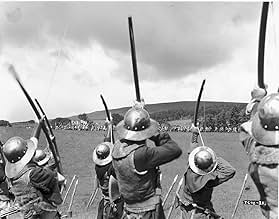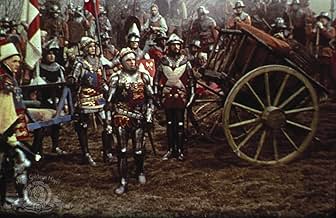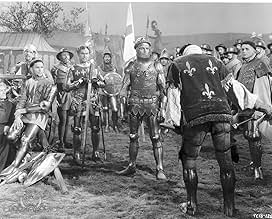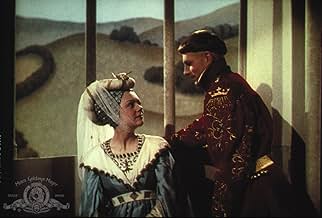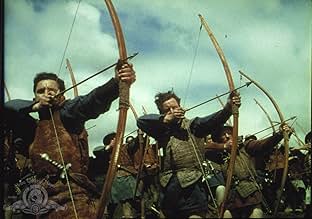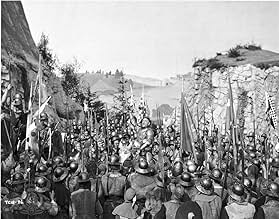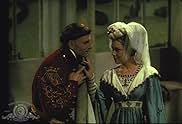Enrique V
Título original: The Chronicle History of King Henry the Fifth with His Battell Fought at Agincourt in France
CALIFICACIÓN DE IMDb
7.0/10
7.4 k
TU CALIFICACIÓN
En plena Guerra de los Cien Años, el joven rey Enrique V de Inglaterra se embarca en la conquista de Francia en 1415.En plena Guerra de los Cien Años, el joven rey Enrique V de Inglaterra se embarca en la conquista de Francia en 1415.En plena Guerra de los Cien Años, el joven rey Enrique V de Inglaterra se embarca en la conquista de Francia en 1415.
- Dirección
- Guionistas
- Elenco
- Nominado a 4 premios Óscar
- 12 premios ganados y 6 nominaciones en total
Opiniones destacadas
What an intelligent film!!! I loved its stage-y quality--The good-humored recreation of a performance in Shakespeare's time with the audience so fully engaged, laughing at jokes we don't understand (e.g., the machinations of churchmen). I loved the details and sense of history--the sets inspired by medieval illuminations and the score by William Walton. The tight script and directing bring out the complexity of the play. Unlike other reviewers, I'd rate it higher than Branagh's more visceral, contemporary version though I can see why some might find this one pallid. It doesn't have a modern feel, and this style of acting Shakespeare feels dated to me--I've grown accustomed to naturalism. Overall, I appreciate that it is many-layered and distinctively English. I hope it accomplished its worthy goal of raising morale during the WWII.
This is seriously fantastic stuff. As many others will know by now, I am a huge fan of Laurence Olivier's work, but this inspirational and revelatory performance surpasses all. The first and most important thing is the timing. Incredible!! Olivier managed to get the whole thing together in time for D-Day! (sorry, that was not quite relevant) The fact is, his portrayal of King Henry V had a deliberate purpose to it... he wanted to give England courage in the war they were fighting, just as King Harry had courage against the french.
Everything, the sets, the colours, all are so majestic and wonderfully theatrical. That's because Olivier did not want to keep his audience on the indifferent grounds of reality. For many in 1944, winning the war was something totally out of reality, just as it was so for the English at the battle of Agincourt. Olivier wished to transport his audience to the god-given victory, and transport them he did. "Once more unto the breach!" Even as a little fourteen-year-old viewer of Sir Laurence speaking these famous words this gave me the curious inspiration... the same that it gave to Winston Churchill sixty years ago. For me, I don't know what the inspiration was for. For Churchill, it was claiming victory in world war 2.
Whatever your taste, background, or personality; this film is inspirational, and recommended viewing for everyone. You would be missing something terrible if you did not see this pure patron of an actor grace the screen majestically with his regal inspiration.
Everything, the sets, the colours, all are so majestic and wonderfully theatrical. That's because Olivier did not want to keep his audience on the indifferent grounds of reality. For many in 1944, winning the war was something totally out of reality, just as it was so for the English at the battle of Agincourt. Olivier wished to transport his audience to the god-given victory, and transport them he did. "Once more unto the breach!" Even as a little fourteen-year-old viewer of Sir Laurence speaking these famous words this gave me the curious inspiration... the same that it gave to Winston Churchill sixty years ago. For me, I don't know what the inspiration was for. For Churchill, it was claiming victory in world war 2.
Whatever your taste, background, or personality; this film is inspirational, and recommended viewing for everyone. You would be missing something terrible if you did not see this pure patron of an actor grace the screen majestically with his regal inspiration.
This is a brilliantly conceived movie-within-a-play-within-a-movie that showcases the genius of Laurence Olivier. Today's audiences are exposed mainly to Olivier the movie actor. But if you want to see a purer form of acting, see Olivier the stage actor. This is possible by watching his Shakespeare plays on film. And these films are by Olivier the "auteur," long before the term was coined. Olivier's is the legacy to which Branaugh and others, who essay Shakespeare on film, must live up to.
And lest you're expecting a camera pointed at a stage, don't worry. Olivier, who produced and directed most of his Shakespeare films, has actually used the film medium to enlarge his plays' visual scope, while maintaining the intimacy that is the essence of live theatre. Also, Olivier is mindful of how daunting the language of Shakespeare is for modern audiences and has modified much of the original script to be more comprehensible, while preserving the feel of Elizabethan English.
Olivier's "Henry V" was to England what Eisentein's "Ivan the Terrible" was to Russia a familiar history rendered as a national epic, for morale purposes, while audiences were fighting off the Germans during World War II. There are other parallels. For example, both use static, formalized composition, in Henry V's case meant to resemble the images in medieval illuminated manuscripts and books of Hours. (In Ivan's case, according to Pauline Kael, like Japanese Kabuki.) Thus, a sound stage "exterior" backdrop becomes a tableau that serves to enhance, with its flat perspective and subjective scale, the view we have of that fabulous Age of Chivalry for which the play's Battle of Agincourt was the closing act.
I've always scoffed at the extravagant accolades which show business gives its own. But after seeing this film, or his equally brilliant "Hamlet," I can understand why Laurence Olivier was so good, that a knighthood wasn't enough, and so he was raised to the peerage.
And lest you're expecting a camera pointed at a stage, don't worry. Olivier, who produced and directed most of his Shakespeare films, has actually used the film medium to enlarge his plays' visual scope, while maintaining the intimacy that is the essence of live theatre. Also, Olivier is mindful of how daunting the language of Shakespeare is for modern audiences and has modified much of the original script to be more comprehensible, while preserving the feel of Elizabethan English.
Olivier's "Henry V" was to England what Eisentein's "Ivan the Terrible" was to Russia a familiar history rendered as a national epic, for morale purposes, while audiences were fighting off the Germans during World War II. There are other parallels. For example, both use static, formalized composition, in Henry V's case meant to resemble the images in medieval illuminated manuscripts and books of Hours. (In Ivan's case, according to Pauline Kael, like Japanese Kabuki.) Thus, a sound stage "exterior" backdrop becomes a tableau that serves to enhance, with its flat perspective and subjective scale, the view we have of that fabulous Age of Chivalry for which the play's Battle of Agincourt was the closing act.
I've always scoffed at the extravagant accolades which show business gives its own. But after seeing this film, or his equally brilliant "Hamlet," I can understand why Laurence Olivier was so good, that a knighthood wasn't enough, and so he was raised to the peerage.
When I saw this movie at age 13 or so, I was terribly disappointed because it was clear that this is the third part in the story. Henry IV Part 1 and Part 2 come before this play, and they tell the story of Sir John Falstaff and his friendship with Prince Hal ( who is Henry V in this play.) The first two plays also introduce Nym, Bardolph, Pistol, and Mistress Quickly. Unfortunately, this play starts after Falstaff has been banished and Prince Hal has become King.
This play is a lot of fun, but it's very frustrating if you haven't read the earlier plays. There are so many poignant (or funny) moments that point backwards. Even the pretend audience at the beginning seems to feel that they want Falstaff back! The best acting moments in this movie are all scenes where the lower characters remember Falstaff and mourn his death.
Of course, there are some heroic battles and speeches in this movie, but looking back after forty years they don't seem as impressive as when I was 13. The great battle is actually over fairly quickly. And a lot of the later scenes drag, like when Captain Fluellen makes Pistol eat his leek. This is played as very bad slapstick when it's actually very violent and brutal in the play.
This play is a lot of fun, but it's very frustrating if you haven't read the earlier plays. There are so many poignant (or funny) moments that point backwards. Even the pretend audience at the beginning seems to feel that they want Falstaff back! The best acting moments in this movie are all scenes where the lower characters remember Falstaff and mourn his death.
Of course, there are some heroic battles and speeches in this movie, but looking back after forty years they don't seem as impressive as when I was 13. The great battle is actually over fairly quickly. And a lot of the later scenes drag, like when Captain Fluellen makes Pistol eat his leek. This is played as very bad slapstick when it's actually very violent and brutal in the play.
With tensions between England and the arrogant French pushed to breaking point, King Henry the Fifth sets out with his armies to conquer and quell the French in their native land. The film builds up with to the historic battle of Agincourt with the troops and the king camping together and making progress across the land.
Whenever Henry V (to use the shorten title) comes on TV I always tape it simply because I always assume that it is a masterpiece of English cinema such is it's reputation in many circles. However this reputation may not be that well deserved as I have decided from my viewing of it today. The plot is Shakespeare and I will not criticise it, but I know myself that it is not a story that I would pick if asked to chose from his canon of work I prefer the darker stuff or the out and out comedies. That aside the film tells a straightforward tale, here used to raise morale and fly the flag of Britain and England during WWII. As such it works but I needed it to be more than just a flag waving exercise, I wanted more detail and more thought. Such scenes exist within the play but Olivier does not use them as well as he uses the grandstanding speeches and battle scene his focus is not on thought but on scale.
As director he does quite well in early stages and in the actual battle itself. The device of opening ad closing in the playhouse works to good effect and is clever but far too many scenes have poor camera angles or are poorly framed. The battle scene is good but too much of the film is ordinary in terms of looks and style. As actor Olivier carries the King well but is too one dimensional for me and I didn't have to put any thought into him to watch the film. He holds back for much of the film but leaps up for more upbeat scenes or rousing speeches. The support cast all sound natural with the dialogue although some of the roles are a little bit hammy, they still hold the film together well.
Overall this is an enjoyable film that has good spectacle to it and key scenes are very good. However the lack of anything under the surface is a problem and it is one of the lesser Shakespearean adaptations I have seen. Still worth a look but if you're like me, you'll be left wondering `was that it?'
Whenever Henry V (to use the shorten title) comes on TV I always tape it simply because I always assume that it is a masterpiece of English cinema such is it's reputation in many circles. However this reputation may not be that well deserved as I have decided from my viewing of it today. The plot is Shakespeare and I will not criticise it, but I know myself that it is not a story that I would pick if asked to chose from his canon of work I prefer the darker stuff or the out and out comedies. That aside the film tells a straightforward tale, here used to raise morale and fly the flag of Britain and England during WWII. As such it works but I needed it to be more than just a flag waving exercise, I wanted more detail and more thought. Such scenes exist within the play but Olivier does not use them as well as he uses the grandstanding speeches and battle scene his focus is not on thought but on scale.
As director he does quite well in early stages and in the actual battle itself. The device of opening ad closing in the playhouse works to good effect and is clever but far too many scenes have poor camera angles or are poorly framed. The battle scene is good but too much of the film is ordinary in terms of looks and style. As actor Olivier carries the King well but is too one dimensional for me and I didn't have to put any thought into him to watch the film. He holds back for much of the film but leaps up for more upbeat scenes or rousing speeches. The support cast all sound natural with the dialogue although some of the roles are a little bit hammy, they still hold the film together well.
Overall this is an enjoyable film that has good spectacle to it and key scenes are very good. However the lack of anything under the surface is a problem and it is one of the lesser Shakespearean adaptations I have seen. Still worth a look but if you're like me, you'll be left wondering `was that it?'
¿Sabías que…?
- TriviaThe opening model shot of London was huge, 50 feet by 70 feet in size, and made of plaster. It took four months to construct.
- ErroresHenry V's reign was in the early 1400s, but most of the costuming in the film is from 1600, the time of the plays writing, almost 200 years later. The armor on the other hand is accurate. In fact, there is no anachronism in the costumes. The story is told from two points of view (one in the 1600s, as a performance in the Globe Theater; the other in the 1400s, as the characters originally lived). Costumes shift on purpose according to the point of view.
- Citas
King Henry V of England: Tell the Dauphin his jest will savor but of shallow wit, when thousands weep more than did laugh at it.
- Créditos curiososThe main title not only gives the full title of the play as William Shakespeare wrote it, but spells the words in the 16th-century manner, not in modern spelling.
- Versiones alternativasIn the American release of the film, all references to "bastards" in the dialogue were excised.
- ConexionesEdited into El dueño del mundo (1961)
- Bandas sonorasAgincourt Hymn (Deo gracias Anglia)
(uncredited)
Latin hymn text set to anonymous tune (1415)
Arranged by William Walton
Selecciones populares
Inicia sesión para calificar y agrega a la lista de videos para obtener recomendaciones personalizadas
- How long is Henry V?Con tecnología de Alexa
Detalles
Taquilla
- Presupuesto
- GBP 475,000 (estimado)
- Total a nivel mundial
- USD 62,619
- Tiempo de ejecución2 horas 17 minutos
- Mezcla de sonido
- Relación de aspecto
- 1.37 : 1
Contribuir a esta página
Sugiere una edición o agrega el contenido que falta

Principales brechas de datos
By what name was Enrique V (1944) officially released in India in English?
Responda


